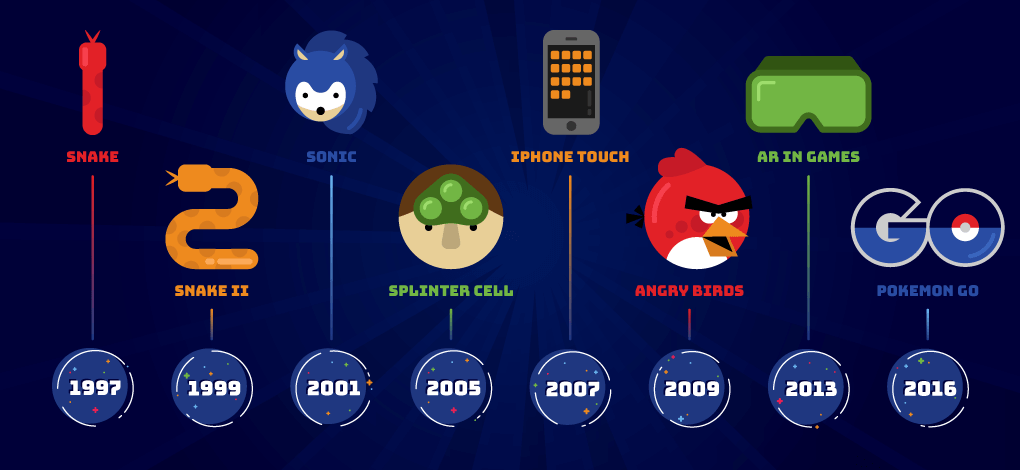The world of mobile gaming has undergone a remarkable transformation over the past few decades, evolving from simple pixelated games to immersive experiences that rival traditional console and PC gaming. As we delve into “The Evolution of Mobile Gaming: What’s Next?”, we will explore the key milestones that have shaped this industry, including the rise of smartphones, advancements in technology, and the impact of social media on gaming culture. With the integration of augmented reality (AR) and virtual reality (VR), mobile gaming is poised for an exciting future that promises to redefine how we play and interact with games.
In the following sections, we will examine the pivotal moments in mobile gaming history, highlighting the innovations that have driven its growth. From the introduction of the first mobile games to the current trends in cloud gaming and subscription services, you will gain insights into how these developments have created a more engaging and accessible gaming environment. Additionally, we will discuss the role of mobile gaming in fostering community and competition, as well as its influence on the broader gaming landscape.
As we look ahead, we will also speculate on the future of mobile gaming, considering emerging technologies and trends that could shape the next generation of games. What can we expect in terms of gameplay mechanics, graphics, and user experience? Join us on this journey as we uncover the exciting possibilities that lie ahead in the realm of mobile gaming. Stay tuned to discover how the evolution of mobile gaming continues to unfold and what it means for gamers around the world.
The Rise of Mobile Gaming
The mobile gaming industry has experienced exponential growth over the past decade. With the advent of smartphones and tablets, gaming has become more accessible than ever. This accessibility has led to a surge in casual gamers, who may not have previously engaged with traditional gaming platforms. The convenience of playing games on-the-go has transformed mobile devices into primary gaming consoles for millions.
As mobile technology continues to advance, so does the quality of games available. High-definition graphics, immersive gameplay, and complex storylines are now commonplace in mobile games. This evolution has attracted a diverse audience, ranging from young children to adults, further solidifying mobile gaming’s place in the entertainment industry.
The Impact of Augmented Reality (AR)
Augmented Reality (AR) has revolutionized mobile gaming by blending the digital and physical worlds. Games like Pokémon GO have demonstrated the potential of AR to create engaging and interactive experiences. Players can explore their real-world surroundings while interacting with virtual elements, enhancing the overall gaming experience.
As AR technology continues to improve, we can expect more innovative games that utilize this feature. Developers are likely to create experiences that encourage physical activity and social interaction, making mobile gaming a more communal activity. The future of AR in mobile gaming looks promising, with endless possibilities for creativity and engagement.
The Role of Cloud Gaming
Cloud gaming is emerging as a game-changer in the mobile gaming landscape. By allowing players to stream games directly from the cloud, this technology eliminates the need for high-end hardware. Players can enjoy console-quality games on their mobile devices without the limitations of storage or processing power.
This shift towards cloud gaming opens up new opportunities for developers and players alike. With the ability to access a vast library of games instantly, players can experiment with different genres and titles without committing to purchases. As internet speeds improve and cloud infrastructure expands, we can expect cloud gaming to become a dominant force in mobile gaming.
The Influence of 5G Technology
The rollout of 5G technology is set to transform mobile gaming by providing faster download speeds and lower latency. This advancement will enhance the overall gaming experience, allowing for smoother gameplay and real-time interactions. Multiplayer games, in particular, will benefit from the improved connectivity, enabling players to compete and collaborate seamlessly.
As 5G networks become more widespread, developers will be able to create more complex and data-intensive games. The potential for augmented and virtual reality experiences will also increase, as these technologies require robust internet connections to function effectively. The future of mobile gaming will undoubtedly be shaped by the capabilities of 5G technology.
The Growth of Esports in Mobile Gaming
Esports has gained significant traction in the mobile gaming sector, with competitive gaming becoming a mainstream phenomenon. Titles like PUBG Mobile and Call of Duty: Mobile have established dedicated esports scenes, attracting professional players and large audiences. This growth has led to increased investment in mobile esports, with tournaments offering substantial prize pools and sponsorships.
The rise of mobile esports is not only beneficial for players but also for developers and publishers. It creates a new revenue stream and enhances the visibility of mobile games. As the esports ecosystem continues to evolve, we can expect more mobile games to incorporate competitive elements, further driving engagement and community building.
Monetization Strategies in Mobile Gaming
Monetization strategies in mobile gaming have evolved significantly, with developers exploring various models to generate revenue. Free-to-play games with in-app purchases have become the norm, allowing players to access games without upfront costs. This model encourages a larger player base, as users can try games before committing financially.
Additionally, subscription services are gaining popularity, offering players access to a library of games for a monthly fee. This approach provides a steady revenue stream for developers while giving players more options. As the mobile gaming market matures, we can expect to see innovative monetization strategies that balance profitability with user experience.
The Importance of Cross-Platform Play
Cross-platform play is becoming increasingly important in mobile gaming, allowing players to connect and compete regardless of their device. This feature enhances the gaming experience by fostering a larger community and enabling friends to play together, regardless of whether they are on a mobile device, console, or PC.
As more games adopt cross-platform capabilities, developers will need to focus on creating seamless experiences that cater to diverse player preferences. This trend not only benefits players but also encourages developers to innovate and improve their games, ultimately leading to a more vibrant gaming ecosystem.
The Future of Mobile Game Development
The future of mobile game development is bright, with advancements in technology paving the way for new possibilities. As artificial intelligence and machine learning become more integrated into game design, developers will be able to create more personalized and adaptive gaming experiences. This could lead to games that learn from player behavior and adjust difficulty levels or content accordingly.
Moreover, the increasing focus on sustainability and ethical practices in game development will shape the industry. Developers are likely to prioritize inclusivity and accessibility, ensuring that games are enjoyable for a wider audience. As the mobile gaming landscape continues to evolve, we can expect exciting innovations that enhance gameplay and foster community engagement.
| Era | Key Developments | Impact on Gaming |
|---|---|---|
| Early 2000s | Introduction of Java and Flash games on mobile | Laid the foundation for mobile gaming; simple games gained popularity. |
| 2007-2010 | Launch of the iPhone and App Store | Revolutionized mobile gaming; access to a wide range of games. |
| 2010-2015 | Rise of freemium models and social gaming | Shifted revenue models; games like Candy Crush became immensely popular. |
| 2015-2020 | Advancements in AR and VR technology | Enhanced gaming experiences; games like Pokémon GO showcased AR potential. |
| 2020-Present | Cloud gaming and 5G technology | Improved graphics and gameplay; accessibility to high-quality games on mobile devices. |
| Future Trends | AI integration, cross-platform play, and immersive experiences | Potential for personalized gaming experiences and broader player engagement. |
Conclusion
The evolution of mobile gaming has been marked by significant technological advancements and changing consumer preferences. As we look to the future, innovations such as AI, cloud gaming, and immersive technologies promise to further transform the landscape, making mobile gaming more engaging and accessible than ever before.



